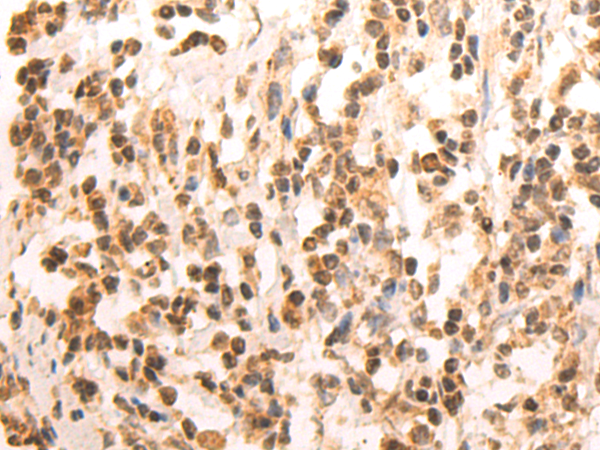

| WB | 咨询技术 | Human,Mouse,Rat |
| IF | 咨询技术 | Human,Mouse,Rat |
| IHC | 1/50-1/200 | Human,Mouse,Rat |
| ICC | 技术咨询 | Human,Mouse,Rat |
| FCM | 咨询技术 | Human,Mouse,Rat |
| Elisa | 1/5000-1/10000 | Human,Mouse,Rat |
| Aliases | BS69; BRAM1; MRD30 |
| WB Predicted band size | 71 kDa |
| Host/Isotype | Rabbit IgG |
| Antibody Type | Primary antibody |
| Storage | Store at 4°C short term. Aliquot and store at -20°C long term. Avoid freeze/thaw cycles. |
| Species Reactivity | Human, Mouse |
| Immunogen | Fusion protein of human ZMYND11 |
| Formulation | Purified antibody in PBS with 0.05% sodium azide and 50% glycerol. |
+ +
以下是关于ZMYND11抗体的3篇参考文献,按文献名称、作者和摘要内容简要概括:
---
1. **文献名称**: *ZMYND11 is a master regulator of a transcription factor network in brain development*
**作者**: Wang J, et al.
**摘要**: 研究通过染色质免疫沉淀测序(ChIP-seq)和蛋白质互作分析,揭示了ZMYND11作为转录调控网络的核心因子,在神经元分化和脑发育中起关键作用。研究使用ZMYND11抗体验证其与染色质修饰复合物(如NuRD)的相互作用。
---
2. **文献名称**: *Epigenetic silencing of ZMYND11 promotes glioblastoma progression*
**作者**: Chen L, et al.
**摘要**: 该研究发现ZMYND11在胶质母细胞瘤中因DNA甲基化而表观遗传沉默,其缺失导致细胞侵袭性增强和患者预后不良。研究通过ZMYND11抗体进行免疫组化(IHC)和Western blot,证实其在肿瘤组织中的低表达。
---
3. **文献名称**: *ZMYND11 links histone H3.3K36me3 to transcriptional elongation and tumour suppression*
**作者**: Guo R, et al.
**摘要**: 研究揭示了ZMYND11通过识别组蛋白H3.3K36me3修饰,调控RNA聚合酶II的转录延伸过程,并抑制癌症发生。实验利用ZMYND11抗体进行免疫共沉淀(Co-IP)和染色质定位分析,验证其在表观遗传调控中的功能。
---
这些文献均涉及ZMYND11抗体在机制研究中的应用,涵盖神经发育、肿瘤抑制及表观遗传调控等领域。如需具体文章链接或补充更多文献,可进一步说明。
The ZMYND11 antibody is a research tool designed to detect the ZMYND11 protein, a transcriptional regulator implicated in chromatin remodeling and epigenetic regulation. ZMYND11 (Zinc Finger MYND Domain-Containing Protein 11) contains multiple functional domains, including a PHD finger, a bromodomain, and a MYND domain, which facilitate interactions with histone modifications and protein complexes involved in gene expression control. Studies suggest its role in neuronal development, DNA damage response, and tumor suppression, particularly in cancers like glioblastoma and hematologic malignancies where ZMYND11 is frequently downregulated or mutated.
As a reagent, the ZMYND11 antibody is widely used in techniques such as Western blotting, immunoprecipitation, and immunohistochemistry to study protein expression, localization, and molecular interactions. Its specificity is critical for validating ZMYND11's involvement in transcriptional repression of oncogenes or cell cycle regulators. However, antibody performance may vary depending on epitope accessibility, post-translational modifications, or cross-reactivity with homologous proteins. Researchers often validate these antibodies using knockout cell lines or siRNA-mediated knockdown to ensure reliability. Current investigations focus on elucidating ZMYND11’s role in neurodevelopmental disorders and cancer pathogenesis, making its antibody a key resource for exploring disease mechanisms and potential therapeutic targets.
×